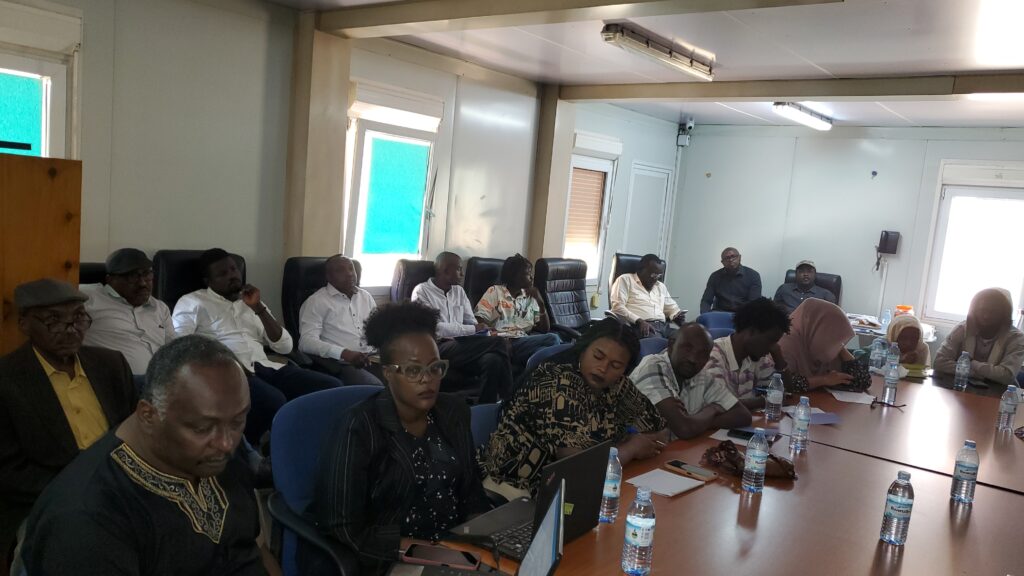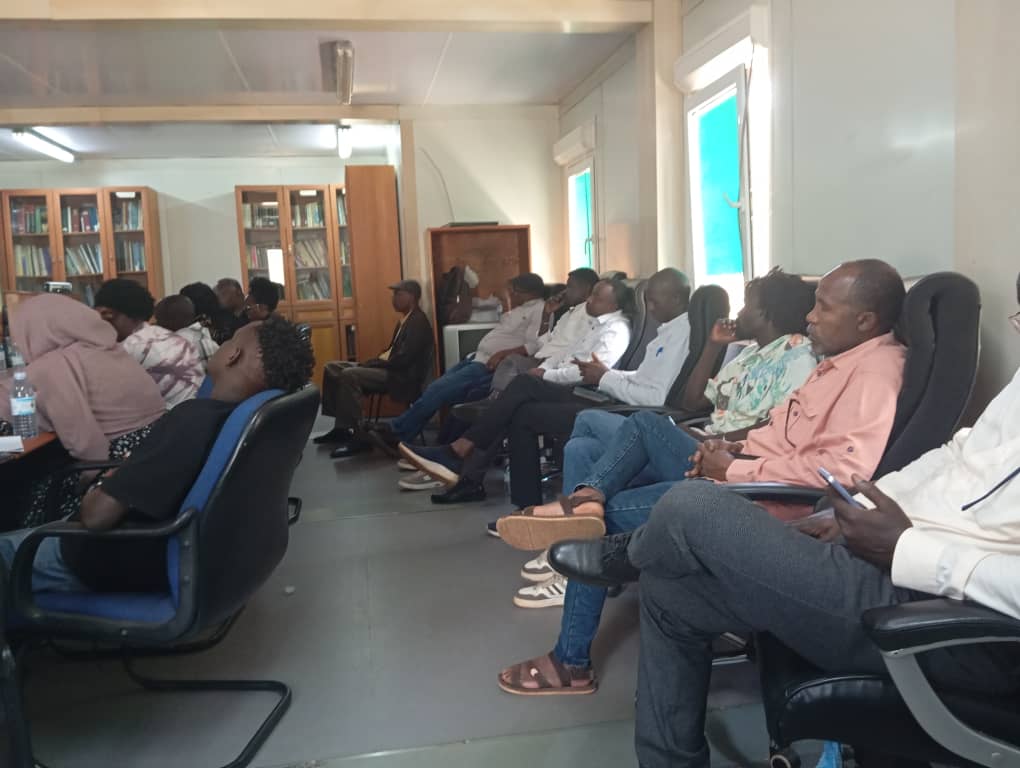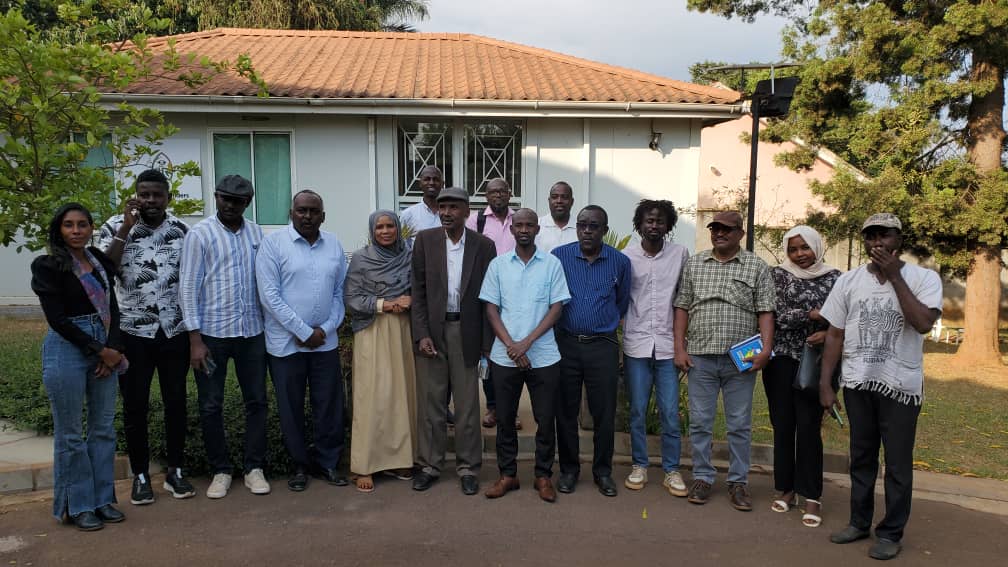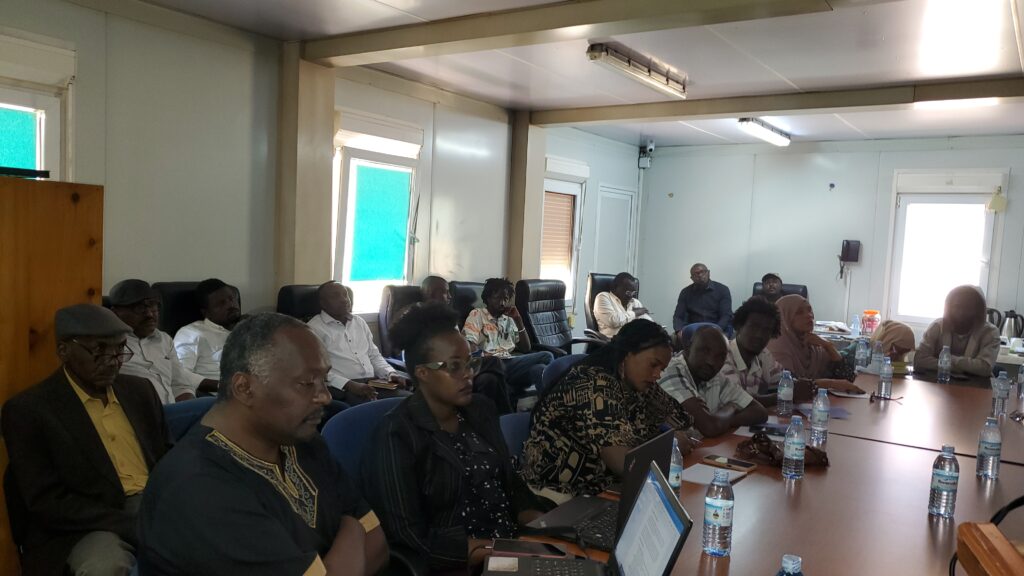On Wednesday, February 19, 2025, a two days’ workshop on the human rights situation in Sudan concluded. The event was held at the headquarters of the Foundation of Human Rights Initiative – Human Rights House in Kampala, Uganda, and was organized by the Nubian Center for Peace and Democracy in collaboration with its partners and key human rights defenders. Among them was the African Center for Democracy and Human Rights Studies, based in Banjul, Gambia, along with several civil society organizations, activists, human rights defenders, and other stakeholders. The two-day workshop aimed to prepare for and engage-both in person and virtually-in the 58th regular session of the United Nations Human Rights Council, scheduled to commence on February 24 and run until April 4, 2025.
The two days’ workshop brought together a distinguished group of young activists working in humanitarian and human rights fields, along with human rights defenders, participating both physically and virtually. The opening session featured remarks from Mr. Abdel-Baqi Jibril, the principal representative of the African Centre for Democracy and Human Rights Studies in Geneva, as well as the Sudanese Knowledge Centre from Geneva. A total of 50 participants attended, both in person and online, alongside a number of experts, academics, investigators, and the coordinator of the fact-finding mission on Sudan.

The workshop sought to foster discussions on integrating and coordinating with regional and international human rights mechanisms in Sudan. It also provided practical insights into the report of the Office of the United Nations High Commissioner for Human Rights and its related mechanisms. Additionally, it aimed to empower Sudanese human rights defenders, civil society organizations, and youth and women’s advocacy groups by equipping them with the tools to craft impactful statements, develop actionable strategies, and identify key messages for meaningful participation in the 58th session of the Human Rights Council in Geneva and the UN General Assembly session in New York.
The workshop addressed a range of critical issues related to human rights violations in Sudan. These included challenges in achieving transitional justice and accountability, particularly amid ongoing widespread violations, as well as the targeting of activists and revolutionaries through arbitrary arrests and enforced disappearances. Participants highlighted the need to protect activists, combat racial discrimination, and address unwritten laws such as the “Alien Faces Law,” which is used as a tool for ethnic discrimination and cleansing. Discussions also covered the absence of clear legislation, the necessity of legal reforms to prevent repressive laws, and cooperation with the International Criminal Court in investigating serious crimes and human rights violations. Other topics included crimes against women, gender-based violence—such as rape and sexual violence as weapons of war—the recruitment of children by armed groups, and the importance of programs for their demobilization and rehabilitation. The workshop further explored religious and ethnic persecution, the need for legal reforms to protect minority groups, the war economy and conflict financing, and the importance of imposing sanctions on individuals and entities exploiting resources to fuel conflict.
Additionally, the workshop focused on accountability, justice, and ensuring an end to impunity. Participants discussed mechanisms to prevent further violations and grave crimes in Sudan and explored ways to coordinate and integrate efforts with regional and international human rights mechanisms. The workshop also examined the upcoming report by the Office of the United Nations High Commissioner for Human Rights, scheduled for submission on February 27, 2025 (A-HRC-58-29). Another key objective was to equip Sudanese human rights defenders—particularly youth and women—with the skills to deliver influential statements and develop effective strategies for participation in the next Human Rights Council session.

Experts provided an in-depth analysis of the significance of upcoming UN sessions, particularly the 60th session, which is of strategic importance as it will present the final report of the Independent International Fact-Finding Mission on Sudan. The 59th session will include the mission’s initial oral report, while the 58th session will focus on the UN Independent Expert’s report on Sudan. The final report of the mission, due in September 2025, is expected to have a major impact on Sudan’s human rights landscape by shedding light on war crimes and grave violations, while calling for international accountability mechanisms.
Participants discussed these issues with a focus on the mandates of UN Human Rights Council mechanisms, previous reports, the Council’s agenda, and the forthcoming report on Sudan’s human rights situation, scheduled for submission on February 27. The discussions also underscored the importance of the 59th and 60th Human Rights Council sessions in September 2025, during which the Fact-Finding Mission’s final report will be presented, as well as the 80th session of the UN General Assembly.
The participants stressed the need for Sudanese civil society organizations to coordinate efforts to ensure unified and effective messaging during Geneva meetings. They also emphasized strengthening collaboration with regional and international mechanisms to ensure the implementation of decisions related to human rights in Sudan. Additionally, they discussed the effectiveness of international and regional mechanisms in protecting and promoting human rights in Sudan, the challenges of coordination among civil society organizations and human rights activists in delivering their messages at UN sessions, and potential improvements to UN mechanisms to ensure justice and accountability.
In addition, the participants agreed to correct that the Fact-Finding Mission will receive statements on all Violations that have occurred and are still occurring in Sudan until the end of July, at the following address: ffmsudan@un.org – ffmsudan@un.org, in addition to reporting to the African Union via the address: Email: sudanffm.achpr@Africa-union.org, and coordination between all these mechanisms, and communication with the Office of the High Commissioner for Human Rights via the following email: ohchr-desudan@un.org.
Participants also highlighted the importance of increased Sudanese engagement in these meetings and the need to unify efforts among human rights defenders—especially young men and women—to ensure strong representation in upcoming sessions, including the 59th session (June–July 2025) and the 60th session (September–October 2025). They emphasized that justice and accountability must be top priorities in the next phase and that national and international efforts should be strengthened to prevent a recurrence of past atrocities. The discussions concluded with a call for establishing strong foundations for human rights, ensuring that Sudanese people can live with dignity and security under a state that respects their rights and fundamental freedoms.

Workshop Recommendations
The workshop concluded with a set of key recommendations, including: Strengthening accountability mechanisms to ensure justice and redress for victims, Reviewing and amending laws and legislation to prevent their misuse in violating human rights, Developing independent mechanisms for verifying digital evidence to ensure reliable investigations, Providing specialized training for monitors and investigators to enhance the quality of human rights reports and Strengthening international cooperation to support investigations and ensure justice is served.
Nubian Center for Peace and Democracy.
February 22, 2025.

